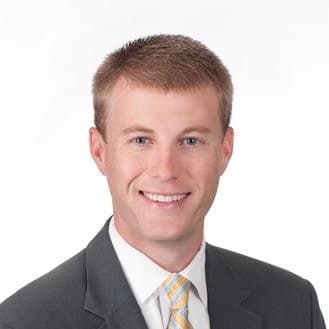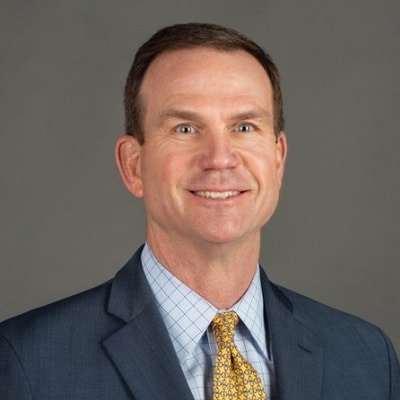Teleworking in the pandemic crisis has been a boon to one of Perimeter Center’s biggest employers — and a bane to its biggest shopping center.
That double-edged sword was discussed by Bill Baker, general manager of Perimeter Mall, and Chris Kirk, an executive with Cox Enterprises and Cox Automotive, at the May 28 installment of the Dunwoody Perimeter Chamber of Commerce’s “Return to the Perimeter” speaker series. A representative of State Farm was originally scheduled to join the discussion but was unable to.
Perimeter Mall’s traffic hit between 40% and 50% of its normal daily numbers since its reopening on May 5, Baker said. What’s hurting the mall is that many of the workers who used to occupy the 32 million square feet of office space nearby are still working remotely.
“I’ve been in shopping center management for a little over 30-plus years. And I’ve never seen anything like this and I hope never to see it again,” Baker said.
For Cox, the shift to telework has been dramatic. Its Perimeter Center campuses, which previously had about 6,000 employees in place, have had around 100 each day during the pandemic.
And the shift has been effective. Kirk said Cox has not seen a significant drop in productivity since everyone began working remotely. “Not that we were expecting it. Clearly, we are all working differently,” he said. “We are all trying to define our new normal.”
Perimeter Mall slowly rebounds
Perimeter Mall, at 4400 Ashford-Dunwoody Road in Dunwoody, closed on March 23. From that date until the reopening, Baker’s staff mostly worked from home. The maintenance staff worked at the mall but kept up social distancing. With no customers at the mall, they were able to clear out a big to-do list of maintenance that regular interruptions for service calls with customers around prevented, Baker said.
“In the mall world, it’s kind of hard to accomplish things if you are not here to a certain degree,” Baker said. Emergency pay or deferred pay from mall owner Brookfield Properties allowed it to not furlough employees.
Most retailers were in their stores every day either doing their own maintenance work or restocking their shelves. The pandemic and closure came almost between seasons for apparel makers, Baker said.
LensCrafters remained open as an essential business, dealing with emergency issues and delivering prescription contacts and glasses at curbside.
Now about 90 of the merchants have reopened, with all department stores and restaurants back to business.
Restaurants are struggling a bit, Baker said.
“The way the new unemployment works, some of their employees were being better served on unemployment than they were when working,” Baker said. “And there were others that just didn’t feel safe coming back as our restaurants reopened.”
Baker said Perimeter Mall, with its location in an urban market, has seen a slower rebound than some other Brookfield malls in rural areas. On reopening day, mall traffic was about 19%.
Steps Baker’s team has taken to make the mall safer include signage at all entrances emphasizing health safety and Centers for Disease Control and Prevention guidelines; removing faucets and soap dispensers that put restroom occupants too close together; and having face masks available for customers who forget to bring one with them. Some stores will require face masks for all customers as well as staff.
The only store that Baker said he knows won’t reopen is Michael Kors. That fashion accessory retailer’s lease ran out during the pandemic, and a crew came in to remove its branding.
Cox preps for regional outbreaks
Cox, a telecommunications, media and automotive industry giant, has seen economic impacts as well. Cox Automotive has furloughed 12,500 global employees for up to 16 weeks.
Kirk, the director for internal control and compliance at Cox Enterprises and Cox Automotive, said he was brought into the planning for responding to the pandemic early on. For the past four to six weeks, that work has shifted into figuring out how to reopen the offices for the 55,000 employees spread across the country and internationally.

Kirk said Cox set its framework around four pandemic levels: red, orange, yellow and blue. “Blue” would signify that a vaccine has been developed and is moving into widespread production.
The decision to reopen resets on senior leadership. But the decision for each office will be made independently based on health data at the county level.
“The company’s data science team put a model together to give leaders some quantitative insight,” Kirk said. “We’re evaluating any local or state government mandates in place and any other factor that might be at play. We are doing it at a very local level.”
Regional coronavirus outbreaks are expected, Kirk said, and the framework enables the company to move the local offices up or down on the pandemic level as they see communities heat up or cool down on outbreaks.
The Cox team has been setting up guidelines about procedures at facilities, including social distancing, common area usage and what sort of personal protective equipment requirements may need to be followed.
Remote working has gone better than expected for Cox, Kirk said.
The pandemic “forced us to push a lot of roles to work at home initially we thought would have had a lot of challenges,” he said. “A lot of those worked seamlessly.”
Under current guidelines, the number of employees who can work on a single floor at the Perimeter Center campuses will drop from around 200 to 65 to meet social distancing requirements. All conference rooms will be blocked off also.
With employees required to work at home, they are asking about furniture, new technology and other supplies needed for a home office. Those are issues the Cox team has to figure out as well.


